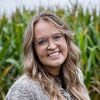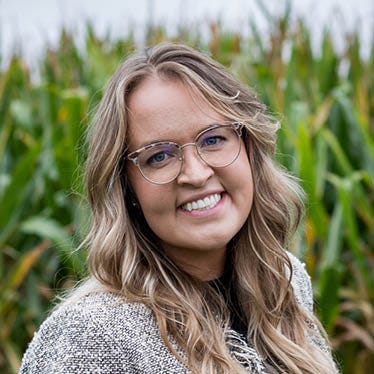December 15, 2023
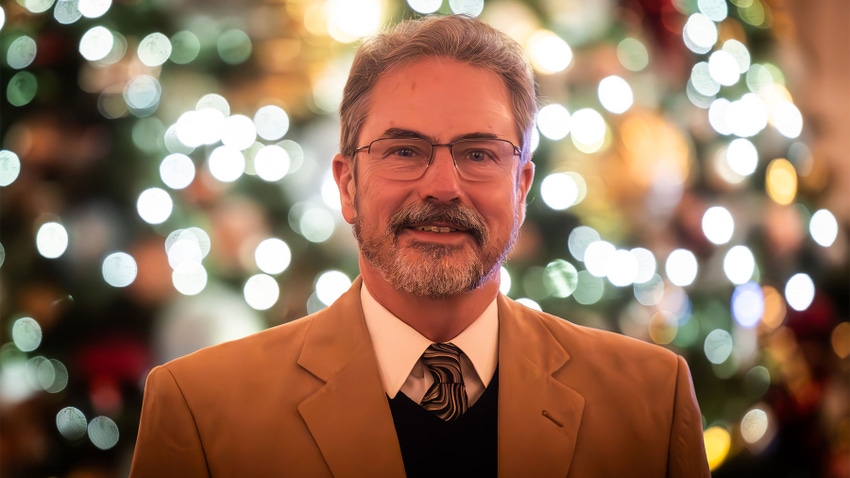
“At the end of the day, you go home knowing you made a difference in people’s lives,” says Mark Gebhards, Illinois Farm Bureau chief strategy officer and assistant to the president. “That’s why I stayed in the association world all these years.”
Gebhards has spent his entire 40-year career working with Illinois farmer associations, where he’s lobbied, written landmark regulations and advocated on behalf of farmers.
He hails from a farm near Springfield, Ill., where his family raised corn, soybeans, cattle and pigs. After Gebhards graduated from Southern Illinois University-Carbondale, his father, a Sangamon County Farm Bureau board member, encouraged him to look into employment with Illinois Farm Bureau. So he did, starting as Stark County Farm Bureau manager in 1982.
“If it weren’t for Farm Bureau, I don’t think agriculture would be in nearly the position we’re in to provide a living for people and to feed the world,” he says.
In 1989, Gebhards was hired by the American Soybean Association as director of state relations, where he acted as the liaison between state soybean associations and ASA. He helped start the national soybean checkoff, in response to a nationwide desire to increase market demand and access for soy, plus promote new uses such as soy diesel and soy ink.
That work is what sparked his interest in policy.
“Policy is about relationships,” Gebhards says. “If you don’t have a relationship with someone, it’s hard to discuss and negotiate legislative positions.”
By 1993, he was back in Illinois, working as Illinois Pork Producers Association executive director. At IPPA, Gebhards helped write the Livestock Management Facilities Act to address environmental issues and operation of livestock farms.
“There was a desire by the environmental community and anti-meat agenda to stop the livestock industry,” Gebhards explains. “We created LMFA to ensure that pork, beef and dairy producers had the ability not only to continue to exist, but to grow their operations.”
He led IPPA through nearly a decade of brutal market conditions, intense regulatory concerns and industry consolidation, before returning to IFB in 2002.
“I always said if I ever had the opportunity to return to Illinois Farm Bureau, I would certainly consider coming back, because I had a tremendous amount of respect for the organization,” Gebhards says. “That happened, and I’ve been here ever since.”
Gebhards worked as the IFB executive director of governmental affairs and commodities for 20 years until last year’s promotion to chief strategy officer and assistant to the president. In this new role, Gebhards says he’ll continue to foster open communication and encourage a strategic look at the future.
“The core principles IFB has always operated under is to build relationships and stay true to our word,” he says. “We keep our own personal opinions out of it and stick to the facts. If I tell a legislator this is where Farm Bureau is at, they know they can count on it.”
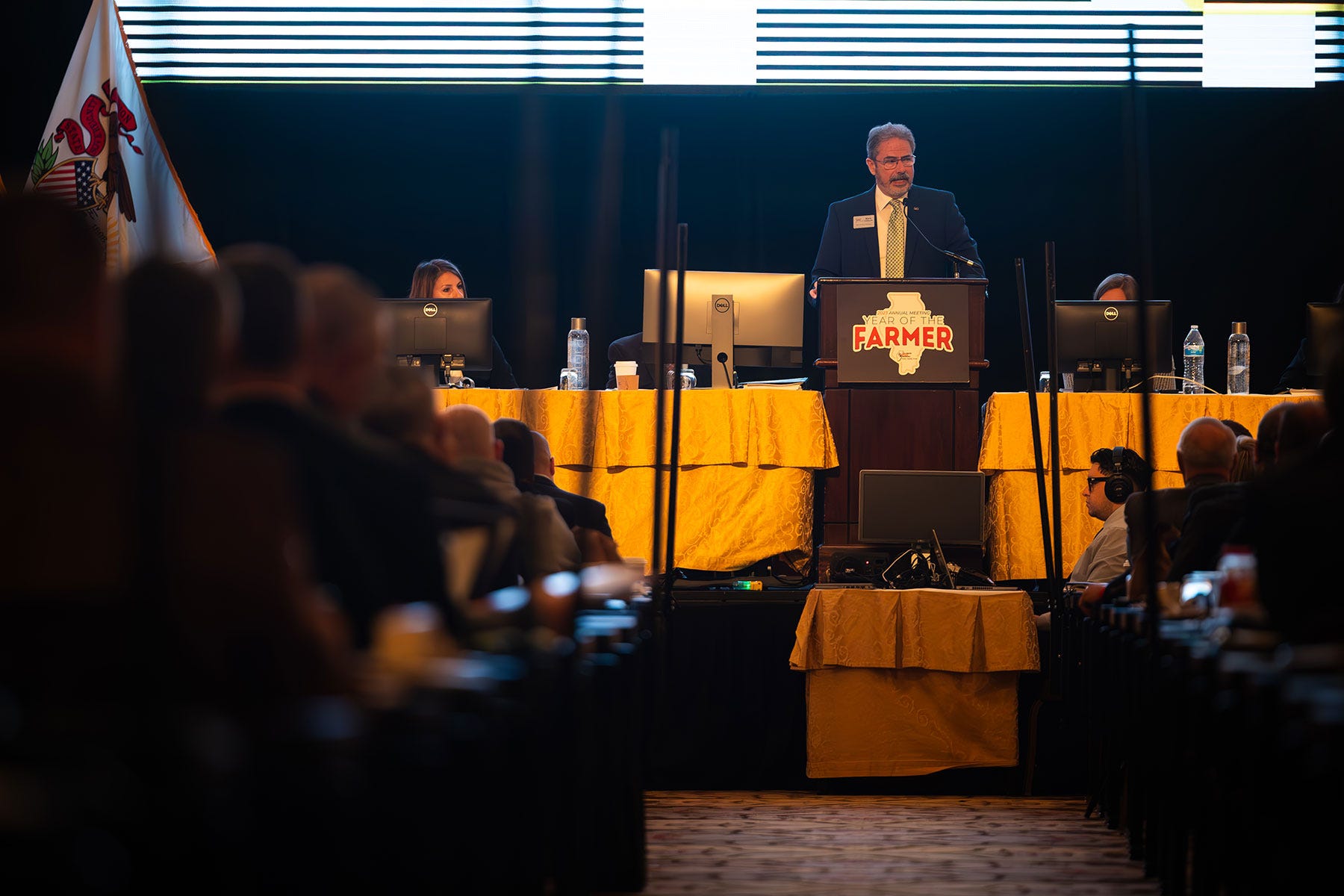
STRATEGY: Mark Gebhards presents the Organizational Member Strategy at the recent Illinois Farm Bureau Annual Meeting in Chicago.
Gebhards took some time to talk with Prairie Farmer:
How has Illinois ag changed during your career? Technology has changed dramatically, making agriculture much better at our production in feeding the world. But technology’s evolution has presented some challenges with policy and regulatory issues, especially in the environmental arena. The livestock industry changed dramatically during my time at Illinois Pork, as contract production entered the pork industry. On the crops side, we’ve dealt with questions around GMOs and agronomic management of nutrients as it relates to environmental regulatory issues. In general, Illinois ag has evolved toward bigger farms, but there’s still a tremendous number of people involved in agriculture and food production.
And what about challenges for ag? Agriculture still has a ways to go to continue to address nutrient management. We have the Nutrient Loss Reduction Strategy, and the numbers associated with it will continue to be a challenge. Water quantity is a big issue out West, and I think unfortunately, that may present some problems here as we see our weather evolve.
How do you get people to agree, compromise and build consensus? In situations where the other party is in obvious disagreement, I start by having a conversation to understand their concerns. I want them to share with me where they are coming from, build a relationship, and try to find out what their position is. It may not be apparent in the beginning, but the more you talk with people, they will say, “What I really have a problem with is this.” Then we can move forward on how we’re addressing and avoiding their concerns.
Is it always possible to find common ground? It’s very difficult to have open conversation if the other party already has their mind made up — for instance, like the anti-meat agenda and anti-agriculture agenda. It doesn’t matter what points we make, because they don’t want us here, period. It’s important to recognize there are organizations that don’t want to find a compromise, and to instead focus on communication with organizations open to dialogue.
How has Illinois policy changed during your career? The Illinois General Assembly has certainly evolved. When I was at Illinois Pork Producers, we had a significant number of people in the General Assembly who farmed or had a direct connection to agriculture. We knew those folks would represent us and work with us. Today, there are very few legislators with ag ties, and we’ve seen an urbanization of the General Assembly.
And what has IFB done to help bridge the gap? The Adopt-A-Legislator Program is one of the best things Illinois Farm Bureau has ever done. We’ve seen urban legislators become sponsors of our legislative issues who I would’ve never dreamed of 15 or 20 years ago. We’ve been able to show elected officials what we do, how we do, and why we do things on the farm. We’ve also tried to build the rural-urban connection by investing in projects focused in urban areas.
What direction do you see IFB going with new leadership? We have a new president, Brian Duncan; new vice president, Evan Hultine, and four new directors. Turnover is good, but you have to continue to build and make sure that new leaders understand their roles and their responsibilities as they guide this organization. Farm Bureau and our other commodity associations are truly grassroots driven. It’s a farmer-driven organization, as it should be, and that’s where our strength comes from.
As we look to the future, we want to put a strategy together that’s still relevant and effective going forward. The involvement of those members at the local level is a critical part of doing that successfully. The Organizational Member Strategy is the vehicle by which Illinois Farm Bureau will ensure that we will be positioned for the future. I am honored to be able to assist in leading that effort.
What is Farm Bureau’s biggest challenge for the future? Getting younger people involved in leadership roles is something we must emphasize. If I think back to my father’s and grandfather’s generations, they were involved in Farm Bureau because they were involved in their communities — that’s just what you did. It’s not that people don’t want to do that, but today, it’s a challenge to find the time to do it. There are so many other demands on people’s time. As an organization, we have to make sure we are using their time effectively and efficiently, and look for ways to engage and develop new leaders.
Do you have a message for young people who are curious about getting involved? There’s a lot you can gain as an individual by getting involved in IFB, your county Farm Bureau or other commodity organizations. By getting involved, you’re ensuring the agricultural industry will continue to exist and prosper. I’ve never met anybody that became involved and regretted it.
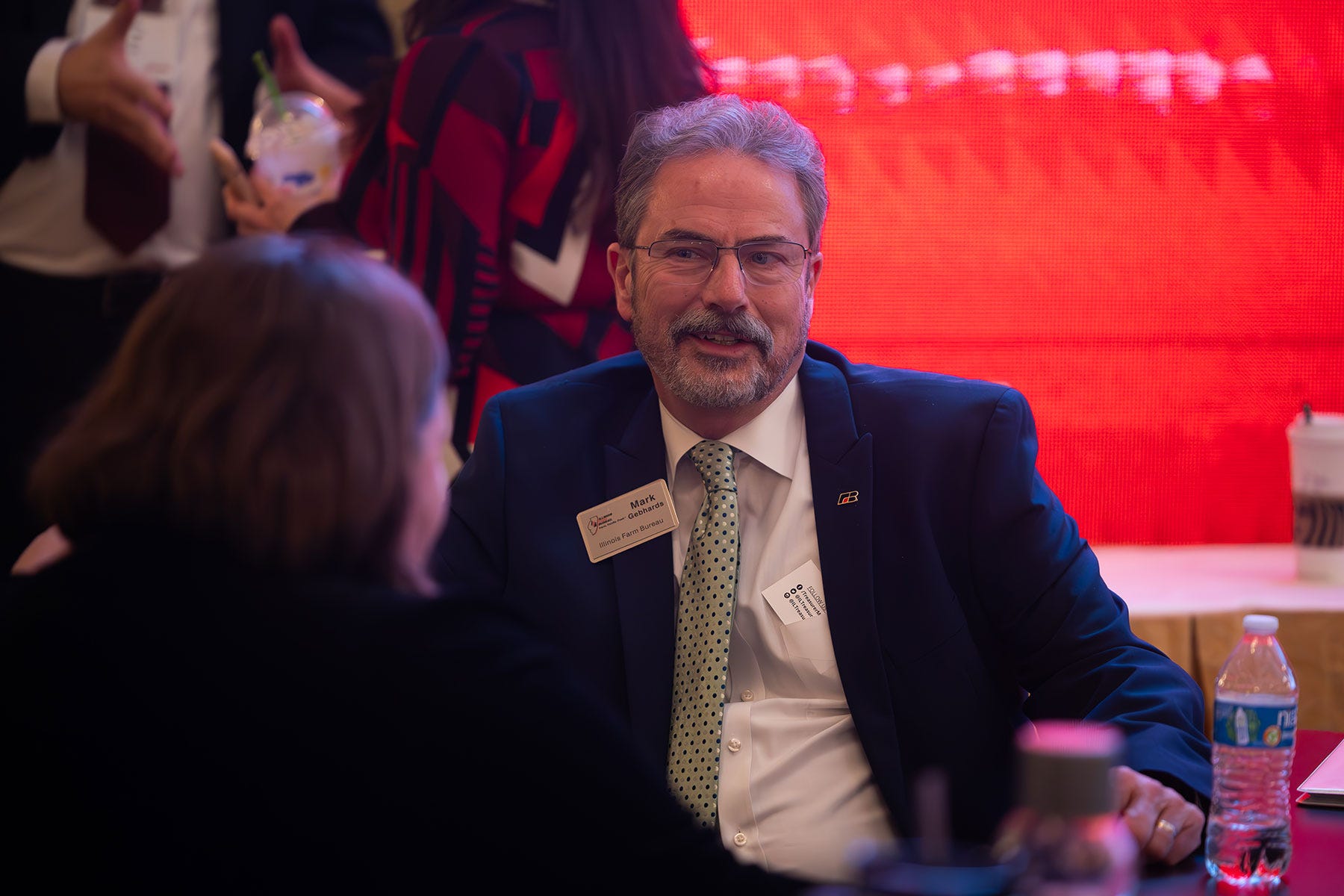
COALITIONS: “Agriculture’s future is in building coalitions at every part of the industry — the farmer, associations, processors and the people we’re feeding,” Mark Gebhards says.
What’s the best piece of advice you’ve ever received? Listen to people and recognize that everybody is dealing with something in their life that may not be positive. Everyone carries around a certain amount of baggage, and you have to be patient and mindful of that.
What do you consider your greatest achievement? Personally, I’m most proud of my family and that I have remained in the ag industry even though I don’t farm. Professionally, I’m most proud of helping craft the LMFA because it has stood the test of time.
Which living person do you most admire? My mother and father. They were instrumental in guiding me to who I am today. My mother got me involved in public speaking, and my father encouraged me to get involved in association work.
If I listened to your Spotify playlist, what would be the song you’ve most listened to? Alan Jackson, George Strait, Brooks & Dunn and Jimmy Buffet.
If your mother wrote a book about you, what would it be called? “Determined to Do It Right.” My mother taught me the value of relationships and treating people right.
Where is your favorite spot in the world? The Carolinas — particularly the Charleston area.
Best live performance? Either Jimmy Buffet in the 1990s or Garth Brooks recently in Champaign, Ill.
How do you spend your free time? I like playing racquetball, pickleball, hunting and running. I also coached baseball for 21 years.
Gebhards in Brief
Favorite tractor? The Oliver I grew up on
Truck? GMC
Livestock? Cattle
Technology? iPhone
Team? Cardinals
Book? Anything written about Lincoln
Family? My wife, Beth, and I have been married 40 years; we have three sons and one daughter.
About the Author(s)
You May Also Like

